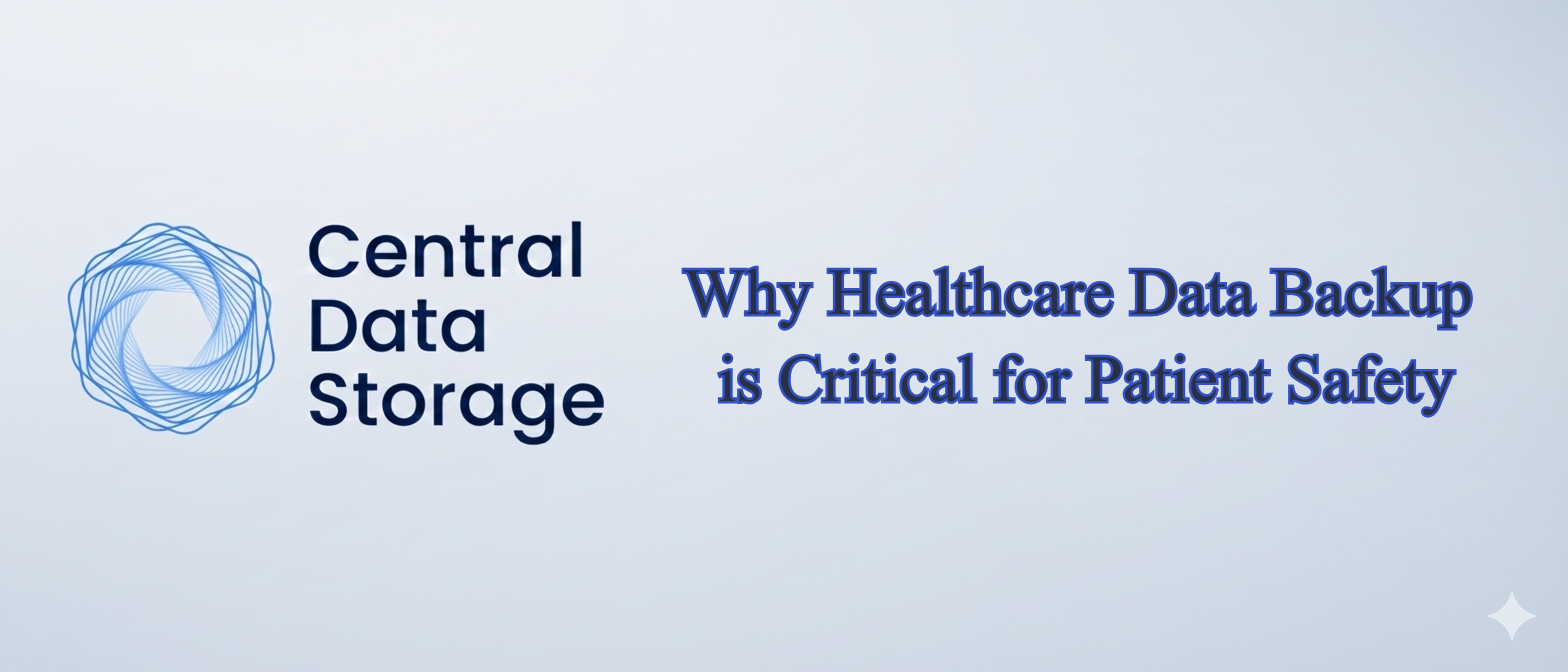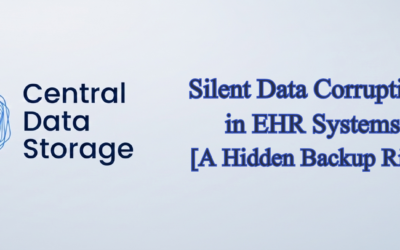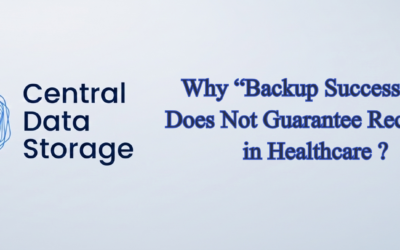Healthcare data backup protects patient safety, clinical continuity, and regulatory compliance. Hospitals and medical practices depend on uninterrupted access to Electronic Health Records (EHR), imaging systems, lab results, prescription histories, and billing platforms. When systems fail, patient care slows — or stops entirely.
Healthcare also faces the highest data breach costs of any industry. According to IBM’s Cost of a Data Breach Report, the average healthcare data breach costs $10.93 million per incident [source]. At the same time, ransomware continues to disrupt hospitals.
Sophos reports that 94% of healthcare ransomware attacks involve data encryption, often forcing organizations to rebuild systems from backups. [source]
Reliable, structured, and tested healthcare data backup solutions are no longer optional. They are a clinical safeguard.
How Healthcare Data Backup Protects Patient Safety?
Clinical teams rely on real-time access to:
- Electronic Health Records (EHR)
- PACS imaging archives
- Lab and pathology systems
- Medication histories
- Scheduling and pharmacy platforms
When these systems go offline, emergency departments, surgical suites, and ICUs are affected immediately.
The Financial and Operational Cost of Downtime
Healthcare downtime is expensive and disruptive.
- IBM: $10.93M average breach cost [source]
- Ponemon Institute research shows downtime can cost thousands per minute [source]
- Recovery expenses include forensic response, regulatory investigation, legal exposure, and lost productivity
Healthcare organizations implementing structured healthcare disaster recovery planning reduce both financial and operational exposure by shortening recovery timelines.
Ransomware Risks in Healthcare and the Role of Verified Backup
Healthcare remains one of the most targeted critical infrastructure sectors, according to the FBI’s Internet Crime Complaint Center.
During ransomware events:
- Surgeries are delayed
- Appointments are canceled
- Manual charting increases errors
- Patient trust declines
Paying ransom does not guarantee recovery. Industry reports show many organizations still rely on backup restoration due to corrupted or incomplete decryptions.
Organizations deploying layered healthcare ransomware recovery solutions with immutable storage significantly reduce operational disruption.
Human Error and System Failure in Healthcare Remain Ongoing Risks
Cyberattacks are not the only cause of healthcare data loss.
Verizon’s Data Breach Investigations Report shows that 74% of breaches involve the human element, [source] including:
- Misconfigurations
- Credential misuse
- Accidental deletion
- Phishing exposure
Additional risks include:
- Hardware failure
- Software corruption
- Power outages
- Natural disasters
Backup systems must include:
- Encrypted offsite replication
- Automated scheduling
- Integrity monitoring
- Documented restore validation
Healthcare organizations that prioritize backup verification and restore testing ensure that recovery works when needed — not just on paper.
HIPAA Data Backup Requirements and Compliance Standards
The HIPAA Security Rule (§164.308(a)(7)) requires:
- A documented data backup plan
- A documented disaster recovery plan
- Emergency mode operation procedures
- Regular testing and revision of contingency plans
Backup systems must protect electronic protected health information (ePHI) during cyberattacks, system failure, or physical disasters.
HIPAA Financial Penalties
The U.S. Department of Health and Human Services (HHS) enforces HIPAA violations with penalties ranging from:
- $100 to $50,000 per violation
- Annual maximum penalties exceeding $1.5 million [source]
Healthcare providers deploying structured HIPAA-compliant backup solutions reduce enforcement exposure and improve audit readiness.
HIPAA does not simply require backups — it requires proof that they work.
Healthcare Disaster Recovery Metrics: RTO and RPO Explained
Two measurable standards define acceptable disruption:
| Metric | Definition | Healthcare Impact |
| Recovery Time Objective (RTO) | Maximum acceptable downtime | Determines how long EHR and clinical systems can remain offline |
| Recovery Point Objective (RPO) | Maximum acceptable data loss window | Defines how much clinical data can be lost |
Recovery Time Objective (RTO)
Hospitals often require RTO measured in minutes for:
- Emergency departments
- ICU monitoring
- Surgical systems
- Pharmacy systems
Extended downtime increases liability and patient safety risk.
Recovery Point Objective (RPO)
If backups run once daily, up to 24 hours of clinical data could be lost. That may include:
- Medication updates
- Lab results
- Diagnostic imaging
- Physician notes
Automated and frequent backup intervals reduce RPO and limit data exposure.
Organizations aligning backup architecture with defined RTO and RPO targets are better positioned for controlled recovery.
Backup Verification: Why Success Messages Are Not Enough?
A backup job that completes successfully does not guarantee recoverability.
Restore testing validates:
- EHR database mounting
- Application boot functionality
- Network dependencies
- Clean restore after ransomware
Modern ransomware increasingly targets backup repositories directly. Without immutability or isolation, recovery options may fail.
Healthcare providers using structured verified healthcare backup and recovery approaches reduce silent data corruption risk and confirm restore integrity before a crisis.
Healthcare Backup Best Practices for Ransomware and Downtime Prevention
Healthcare environments require layered protection:
- 3-2-1 Backup Rule
-
- 3 copies of data
- 2 different storage media
- 1 offsite copy
- Automation: Reduces human error and missed backup intervals.
- Immutable or Air-Gapped Storage: Prevents ransomware from modifying backups.
- Encryption: Protects ePHI at rest and in transit.
- Scheduled Recovery Drills: Validates performance against RTO and RPO.
Healthcare organizations implementing structured healthcare data protection strategies strengthen resilience across cyber, operational, and regulatory risks.
Aligning Backup Strategy With Organizational Risk
Not all healthcare environments carry the same exposure.
| Organization Type | Primary Risk | Protection Focus |
| Small Practice | Limited IT oversight | Automated encrypted backups |
| Multi-Site Clinic | Operational complexity | Local + offsite redundancy |
| Hospital System | High downtime cost | Verified recovery + immutability |
Unison Backup Solutions for Healthcare
Central Data Storage (CDS) offers structured healthcare backup models aligned to risk level:
- Unison Lite – Encrypted, automated backup for small medical practices
- Unison BDR– Local + offsite business continuity solution for mid-sized environments
- Unison Complete– Fully managed healthcare cyber backup with clean, verified restore validation
All solutions emphasize clean recovery, compliance logging, and restore verification — not just data storage.
Backup Is Not Optional in Healthcare — Recovery Is Essential
Backup is no longer an IT convenience. It is a clinical risk management strategy.
Structured, encrypted, tested, and verified backup systems:
- Protect patient safety
- Reduce downtime
- Support HIPAA compliance
- Prevent ransomware extortion
- Preserve institutional reputation
If your organization is unsure whether its backup systems would survive a real-world ransomware attack or disaster event, request a structured recovery evaluation.
👉 Request a Healthcare Backup Risk Assessment
👉 Speak with a healthcare recovery specialist
Because in healthcare, backup is not about storage. It is about recovery — when care cannot wait.
FAQs – Importance of Data Backup in Healthcare
How often should healthcare organizations back up Electronic Health Records (EHR)?
Healthcare organizations should back up Electronic Health Records at least every 15–60 minutes for critical systems. Frequent backups reduce Recovery Point Objective (RPO) and prevent loss of clinical notes, lab results, and medication updates.
What is the difference between local backup and cloud backup in healthcare?
Local backup stores medical data onsite for fast recovery, while cloud backup stores encrypted copies offsite for disaster protection. A combined local + offsite model reduces downtime and protects against ransomware and physical disasters.
How long must healthcare providers retain backup data for compliance?
Healthcare providers must retain backup data based on HIPAA, state retention laws, and payer requirements. Many states require medical record retention for 6–10 years, and backup policies should align with those legal timelines.
Can ransomware infect healthcare backup systems?
Yes, ransomware can infect connected backup systems if storage is not immutable or isolated. Healthcare organizations should use encrypted, immutable, or air-gapped backups to prevent attackers from modifying recovery copies.
How do healthcare organizations test whether backups will actually restore?
Healthcare organizations test backups by performing documented restore drills, validating EHR database mounts, verifying application functionality, and confirming clean recovery without malware persistence.
Last updated on February 17, 2026



